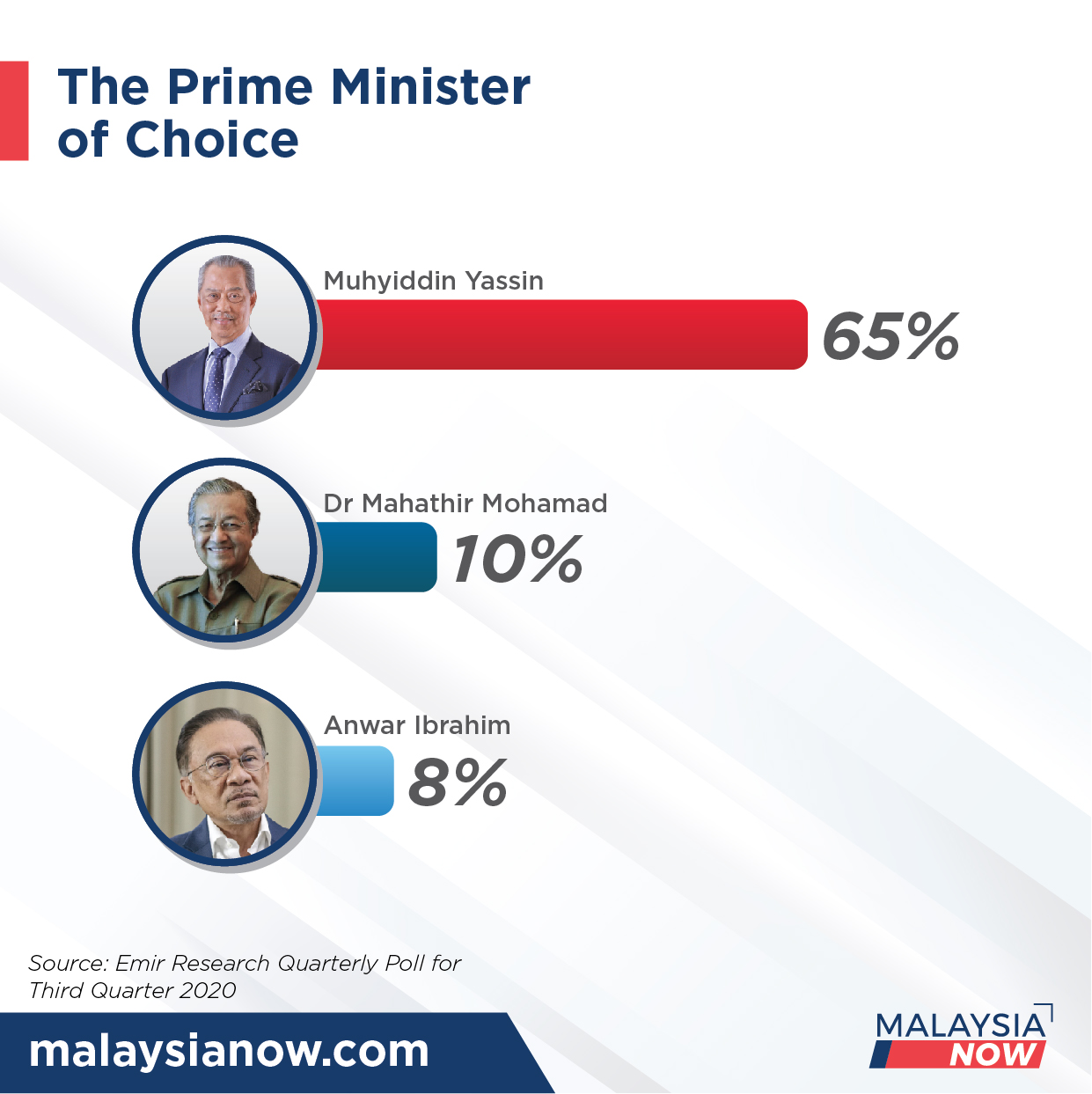Muhyiddin trumps Dr M, Anwar in new survey
Poll indicates that the prime minister also enjoys greater endorsement from non-Malays despite their lower support for the government.
Just In
The Perikatan Nasional (PN) government appears to enjoy a higher rate of endorsement for its policies now compared to when it first took power, with some 65% giving the thumbs-up to Prime Minister Muhyiddin Yassin, according to a recent survey conducted by a think tank.
Emir Research, whose poll in August involved over 2,000 respondents nationwide, said Dr Mahathir Mohamad came in second as “the prime minister of choice” with 10% of support, followed by Anwar Ibrahim with 8%.
The two leaders have in the past openly declared their interest for the top post.
The poll said 73% of female respondents had thrown their support behind Muhyiddin, who also gained more support among the younger age groups.
While he had more support among the Malays and other Bumiputera ethnicities, approval for the prime minister was also strong among the Chinese (50%) and Indians (49%), the poll said.
In comparison, Mahathir had 9% of Malay support and 25% from the Chinese-Indian ethnic groups. Meanwhile, Anwar had only 5% of support from Malays and 38% from Chinese and Indians.
Emir Research also noted that the non-Malay support for Muhyiddin as “prime minister of choice” contradicts the communities’ lower support for the government.
“One possible explanation for these perplexing results could be the unanimous yearning for government stability which was one of the most pronounced themes in our qualitative research study,” it added.
“As one of the discussants sums it up: ‘Many people said that this current government is the government that we need, not the government that you want, not the government that we have chosen’,” said a report released by the think tank.
Muhyiddin was sworn into office just days after the Pakatan Harapan government collapsed following Mahathir’s resignation.
His nine-month rule has been dominated by the battle against Covid-19, with the government forced to announce multi-billion ringgit rescue packages to cushion the pandemic’s impact on the economy.
Satisfaction with the government
The poll said PN scored a Government Satisfaction Index (GSI) of 0.67 in the third quarter of this year compared to 0.45, indicating a 49% increase.
Emir Research said the GSI score is “above average”, and a marked increase from a similar survey it conducted late last year which gave the government a score of 0.45 in the first quarter of 2020.
“The respondents’ sense of confidence and optimism for the future, and hence a higher satisfaction towards the government, is likely due to their endorsement of the government’s effort to balance lives and livelihoods by reopening the economy and announcing stimulus packages, while at the same time balancing the measures to mitigate Covid-19 infections and searching for vaccines,” the research house said in the latest series of its survey titled “Pulse From The Ground”.
The survey results also showed an emerging pattern of more Malaysians ignoring party affiliations in their political choice.
Some 29% of them said they would support principle-based politics, slightly more than those who look out for parties (25%) and individuals (24%).
The report said the trend of “principle-based politics” was “interesting”, although it was more apparent among urban Malaysians.
The survey also offered a glimpse of political loyalties among respondents, with most Malays (51%) favouring Umno.
DAP received the bulk of support from Chinese and Indian Malaysians, while Bersatu enjoyed greater support among the Sabah and Sarawak Bumiputeras.
The report said most of the support for Umno (49%) comes from the lower income group, or those earning below RM1,500, while the more affluent Malays back Bersatu and PAS.
The bulk of Umno’s support also comes from those with lower academic qualification, the survey said.
Subscribe to our newsletter
To be updated with all the latest news and analyses daily.




